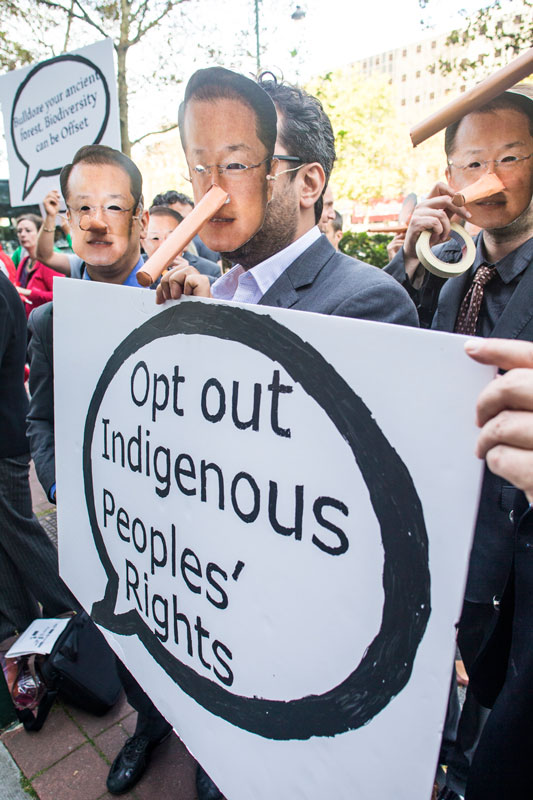
[tfg_social_share]
Brussels, 18 September 2014. Today, protesters will gather at the World Bank’s offices in Brussels to protest its moves to weaken policies meant to protect people and the environment. Wearing Pinocchio masks, protesters will question why Bank President Jim Yong Kim went back on his word not to dilute the Bank’s policies.
The protest marks the first in a wave of protests expected around the world, as human rights, labour, environmental and development civil society organisations (CSOs) unite in rejecting the first draft of the Bank’s new Safeguard Policies, released for consultation this month.
“The Bank is dismantling protections that communities, trade unions and CSOs have fought for over decades. It is rolling back 30 years – going back to the bad old days when Bank-funded projects could trash the environment and people’s lives and livelihoods,” said Nezir Sinani of the Bank Information Center.
“Weakening the Safeguards would make the Bank’s twin goals of ending extreme poverty and promoting shared prosperity impossible to achieve,” said Knud Voecking of Urgewald in Germany. “President Kim promised back in 2012 that there would be ‘no dilution’ of the Safeguards. Why has he backtracked on that promise?”
If approved, the new Safeguards would enable countries to:
- Opt out of essential labour protections enshrined in the ILO Core Conventions, including freedom of association and the right to collective bargaining
- Opt out of guaranteeing indigenous peoples’ rights
- Self-assess whether they are meeting the Bank’s standards
- Ignore existing protections for biodiversity
Sharan Burrow of ITUC stated: “While we welcome the intention of the World Bank to adopt a labour safeguard, the version proposed would have almost no impact in protecting the rights of those who work in Bank-financed projects, since it would not apply to contracted workers nor, except for some very limited provisions, to public servants. By proposing to not protect these workers in its projects, the World Bank will perpetuate instances of unsafe working conditions, child labour, unpaid wages and denial of freedom of association that we have seen in Bank-funded projects.”
The Bank lends over €38 billion a year to developing countries. By weakening key requirements at a time when the Bank is expanding lending to riskier projects like large dams and large-scale ‘transformational projects’ and increasing lending to Fragile and Conflict-Affected states, the proposed revisions risk the most impoverished and marginalised people bearing the brunt of negative social and environmental impacts.
The new policy proposal will also lower the bar for development finance institutions that look to the World Bank as a trend-setter. Pieter Jansen of BothEnds, based in the Netherlands, said, “The World Bank has fallen far short of its goal of setting a new global standard when it comes to protecting the rights of the poor and the planet. Instead, it risks setting off a race to the bottom that is likely to have negative consequences for social and environmental standards globally.”
Antonio Gambini of CNCD-11.11.11 based in Brussels, Belgium adds, “Our organisations demand that the current draft be substantially revised to ensure that people and the environment are not left worse off. The Bank must realise that human rights – including labour rights, indigenous peoples’ rights, and rights to livelihood – as well as sustainability principles are fundamental to the Bank being able to achieve its twin goals of eliminating extreme poverty and raising shared prosperity.”
“It is crucial that the Bank listens to civil society actors around the world, and to representatives of affected communities. We call on the Bank to use this rare opportunity to establish new models for inclusive engagement that will burnish, rather than burn, its development legacy,” said Petra Kjell of the Bretton Woods Project in London.
Notes to editors:
The World Bank Group published a first draft of its new safeguard policies in July 2014, and this month launched a global consultation process. Despite nearly two years of consultations with stakeholders, the World Bank largely ignored the substantive input provided and concerns raised by CSOs, thus raising doubts about the consultation process itself. CSOs strongly object to the World Bank’s safeguard consultation draft, because it falls well short of the rules needed to protect the planet and respect the rights and interests of workers and affected communities by activities funded by the Bank. The proposed draft derogates from well-established international standards, and represents a major weakening of the existing safeguards requirements of the World Bank and in key areas falls far below the standards of other development banks. It also fails to recognise that the safeguards represent a critical tool to ensure that investment benefits the poorest and most marginalised sectors of society, which, as President Kim has claimed, is the Bank’s ‘comparative advantage.’
The protest is called by groups including: Both ENDS, Bank Information Center, CNCD-11.11.11, Eurodad, Re:Common, Urgewald, Bretton Woods Project, 11.11.11- Vlaamse Noord-Zuidbeweging, FGTB-ABVV, CSC-ACV and ITUC
